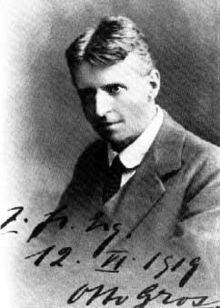- Otto Gross
-
Otto Gross (1877–1920) was an Austrian psychoanalyst. A maverick early disciple of Sigmund Freud, he later became an anarchist and joined the utopian Ascona community.
His father Hans Gross was a judge turned pioneering criminologist. Otto initially collaborated with him, and then turned against his determinist ideas on character.[1]
A champion of an early form of anti-psychiatry and sexual liberation, he also developed an anarchist form of depth psychology (which rejected the civilising necessity of psychological repression proposed by Freud). He adopted a modified form of the proto-feminist and neo-pagan theories of Johann Jakob Bachofen[2], with which he attempted to return civilization back to a postulated 'golden age' of non-hierarchy. Gross was subsequently ostracized from the larger psychoanalytic movement, and was not included in histories of the psychoanalytic and psychiatric establishments. He died in poverty.
Greatly influenced by the philosophy of Max Stirner[3] and Friedrich Nietzsche and the political theories of Peter Kropotkin, he in turn influenced D. H. Lawrence (through Gross' affair with Frieda von Richthofen), Franz Kafka and other artists, including the founders of Berlin Dada. His influence on psychology was more limited. Carl Jung claimed his entire worldview changed when he attempted to analyse Gross and partially had the tables turned on him.[4]
As a Bohemian drug user from early youth, as well as an advocate of free love, he is sometimes credited as a founding grandfather of 20th Century Counterculture.
Contents
Contributions to Depth Psychology
Carl Jung credited Gross with having described two general types – "inferiority with shallow consciousness" and "inferiority with contracted consciousness" – that very closely resemble what Jung described as the extraverted feeling and introverted thinking types a decade later. Despite having issues with Gross' theoretical assumptions of a secondary cell function and the "individual" nature of a person's passion, Jung credited Gross with major advances in typological and psychological theory.
In his 1913 work A Contribution to Psychological Types, Jung devoted a paragraph to Otto Gross' contributions.
The relation he [Gross] established between manic-depressive insanity and the type with a shallow consciousness shows that we are dealing with extraversion, while the relation between the psychology of the paranoiac and the type with a contracted consciousness indicates the identity with introversion (Jung, [1921] 1971: par. 879).
In Jung's monumental work Psychological Types, all of chapter VI, The Type Problem in Psychopathology, analyzes and reconciles Gross' theory as expressed in Die zerebrale Sekundärfunktion (1902) and Über psychopathische Minderwertigkeit (1903).
Gross deserves full credit for being the first to set up a simple and consistent hypothesis to account for this [the extraverted] type (Jung, [1921] 1971: par. 466).
Notes
- ^ Ronald Hayman, A Life of Jung (1999), p. 99.
- ^ Hayman, p. 101.
- ^ Bernd A. Laska: Otto Gross zwischen Max Stirner und Wilhelm Reich, Aus: Raimund Dehmlow & Gottfried Heuer, Hg.: 3. Internationaler Otto-Gross-Kongress, Ludwig-Maximilians-Universität, München. Marburg: LiteraturWissenschaft.de 2003, S. 125–162, ISBN 3-936134-06-5
- ^ Hayman, p. 102.
References
- Jung, C.G. ([1921] 1971). Psychological Types, Collected Works, Volume 6, Princeton, N.J.: Princeton University Press. ISBN 0-691-01813-8.
- Jacques Le Rider : Modernity and Crises of Identity: Culture and Society in Fin-de-siecle Vienna, Verlag: Polity Press, 1993, ISBN 0745609708
External links
- The Otto Gross Society is dedicated to preserving his work
Categories:- 1877 births
- 1920 deaths
- Austrian psychoanalysts
- Austrian anarchists
- Philosophy of sexuality
Wikimedia Foundation. 2010.

